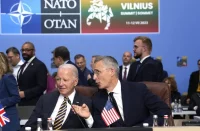Anything less than threatening an oil embargo against Israel and its Western allies will likely fail to get the former to open up a humanitarian corridor, but this requires a degree of political will, trust, and coordination between the participating countries that can’t be taken for granted.
Many observers considered last weekend’s Cairo Summit to be a failure after the lack of any joint statement, but nobody should have ever expected one since this event wasn’t actually intended to achieve that purpose. To be sure, each of the three camps that were represented there – the pro-Palestinian, pro-Israeli, and neutral ones – lamented this outcome and opportunistically blamed others for it, but none of their diplomats realistically expected an agreement to be reached.
Rather, the whole point of that get-together was for every party to candidly express their positions on this issue, after which they’d have a clearer idea of where everyone stands and could then initiate potentially more productive diplomatic engagements either on the sidelines of the event or outside of it. In this sense, the Cairo Summit was a success since there’s no longer any doubt about where each of the participating countries stand. Their diplomats can now formulate more effective policies as a result.
There are objective limits to what each of the previously described three camps are capable of doing. The pro-Israeli one led by the US is against the formal involvement of any third parties in the latest war, hence the redeployment of their naval assets to the region in order to deter this scenario. Accordingly, the pro-Palestinian camp represented most relevantly by Egypt, Jordan, and Turkiye – all of which officially recognize Israel – are unlikely to risk the hegemon’s wrath by going to war in support of Hamas.
As for the neutral one led by Russia, the aforesaid dynamics disappointingly suggest that there’s no credible chance for a ceasefire anytime soon since US-backed Israel is hellbent on destroying Hamas out of vengeance, which will require a ground operation in Gaza unless it unexpectedly walks back its plans. That being the case, everything is only going to get worse before it gets better, but that doesn’t mean that the pro-Palestinian and neutral camps can’t help make a positive difference in some respect.

The humanitarian consequences of Israel’s disproportionate response to Hamas’ infamous terrorist attack have turned most of the international community, including many Westerners, against the self-professed Jewish State. If it’s impossible to prevent the conflict’s escalation by convincing Israel to abandon its planned ground operation, then the most pragmatic policy that these two camps can pursue is trying to relieve some of the Gazans’ suffering through the creation of humanitarian corridors.
Two challenges stand in the way of this noble goal: 1) Egypt is against allowing Palestinian refugees to enter its territory since it fears that Israel will never let them return; and 2) Israel is also against sheltering these refugees on the grounds that public opinion wouldn’t support it after Hamas’ attacks. Additionally, both claim that each scenario entails unconventional threats to their countries, with each of them prioritizing their own national security over the personal security of Gaza’s over 2 million people.
The end result is that these refugees continue dying as “collateral damage” of the incessant strikes that Israel carries out on anti-terrorist pretexts, which infuriates the global masses and especially those in majority-Muslim countries, who feel powerless to stop the Gazans’ suffering. Without the creation of humanitarian corridors and amidst the spike in violence that’s expected to follow the onset of Israel’s planned ground operation, there’s a very real risk of riots breaking out across the world.
Western countries could either brutally suppress them like they did those that occurred during the height of the pandemic or stand aside due to their elites’ self-interested political reasons like they did during the Antifa-BLM riots all across the US over summer 2020. In either case, their national stability wouldn’t seriously be threatened even if some extremists carry out terrorist attacks against those who participate in this unrest, but the same can’t be said for many majority-Muslim countries.
These states could struggle to contain such riots since some of their security personnel might refuse to crack down on the participants if they sympathize with their pro-Palestinian cause, and even if they follow orders, the masses might riot more on the pretext that their governments are “Zionist puppets”. After all, their riots would have begun as protests in support of a noble cause, so it would be seen by the participants as a betrayal of the Palestinians, fellow Muslims, and humanity to violently disperse them.
With a view towards averting that worst-case but nevertheless plausible scenario, it would therefore be a good idea for the pro-Palestinian and neutral camps to collaborate on ways to most compellingly pressure Egypt and/or Israel to open up humanitarian corridors. Since it’s unlikely that majority-Muslim countries will team up against one of their own, these efforts would thus almost certainly be directed against Israel and its Western allies, which could most effectively take the form of an oil embargo.
Many Westerners already sympathize with the Palestinians’ plight so they could be counted on to pressure their governments to accede to these demands via large-scale protests across their bloc if majority-Muslim energy-exporting states and Russia give them an ultimatum. Their decisionmakers might still refuse to do their utmost in forcing Israel to host these refugees or the self-professed Jewish State might defy them in spite of their efforts, but it’s arguably the best way to advance this noble goal.
Anything less than threatening an oil embargo against Israel and its Western allies will likely fail to get the former to open up a humanitarian corridor, but this requires a degree of political will, trust, and coordination between the participating countries that can’t be taken for granted. Seeing as how no indication has yet to emerge suggesting serious interest in this, it therefore remains speculative for now, but that could quickly change if public pressure becomes unbearable in many majority-Muslim countries.
Source: the author’s blog














Comments